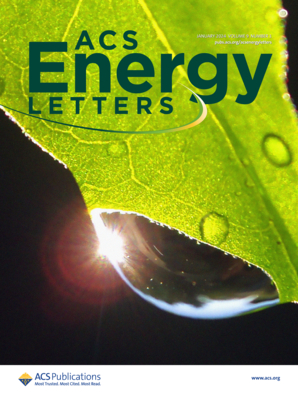用于全固态锂金属电池的软基阴离子固定共价有机框架的 Li+ 传导能力
IF 19.3
1区 材料科学
Q1 CHEMISTRY, PHYSICAL
引用次数: 0
摘要
有机固态电解质(SSE)具有更高的安全性和灵活性,但也面临着室温下离子电导率低的挑战。共价有机框架(COFs)通过防止片段运动和促进 Li+ 离子通过具有规则排列阴离子基团的纳米多孔通道转移,提供了一种很有前景的解决方案。特别是,将 Li+ 离子从这些固定的阴离子基团中解离出来对于提高 Li+ 离子的传导性至关重要。然而,为了更容易地解离 Li+,设计具有电子遥感和软碱(如含氟磺酰亚胺阴离子基团)的 COF 时,一直受阻于这些构件的高难度合成。在这里,我们成功合成了磺酰基(三氟甲烷磺酰基)亚胺(TFSI-)官能化 COFs,并在 25 °C 时证明了 7.65 × 10-5 S cm-1 的显著 Li+ 离子电导率,超过了所有已知的有机 SSE。这种单一的 Li+ 离子导体在锂电池和磷酸铁锂电池中的循环能力超过了 200 倍,标志着向开发更好的有机 SSE 迈出了实质性的一步。本文章由计算机程序翻译,如有差异,请以英文原文为准。

Li+ Conduction of Soft-Base Anion-Immobilized Covalent Organic Frameworks for All-Solid-State Lithium–Metal Batteries
Organic solid-state electrolytes (SSEs) offer improved safety and flexibility, but they face challenges with low ionic conductivity at room temperature. Covalent organic frameworks (COFs) present a promising solution by preventing segmental motion and facilitating Li+ ion transfer through nanoporous channels with regularly aligned anionic groups. In particular, dissociating Li+ ions from these immobilized anionic groups is crucial for increasing Li+ ion conductivity. However, the design of COFs with electron-delocalized and soft bases, such as fluorinated sulfonimides anionic groups, for easier Li+ dissociation has been hindered by the challenging synthesis of these building blocks. Here, we successfully synthesized sulfonyl(trifluoromethanesulfonyl)imide (TFSI–)-functionalized COFs and demonstrated a remarkable Li+ ion conductivity of 7.65 × 10–5 S cm–1 at 25 °C, which surpasses all known organic SSEs. This single Li+ ion conductor achieved over 200 times cyclability in Li and LiFePO4 cells, representing a substantial step toward developing better organic SSEs.
求助全文
通过发布文献求助,成功后即可免费获取论文全文。
去求助
来源期刊

ACS Energy Letters
Energy-Renewable Energy, Sustainability and the Environment
CiteScore
31.20
自引率
5.00%
发文量
469
审稿时长
1 months
期刊介绍:
ACS Energy Letters is a monthly journal that publishes papers reporting new scientific advances in energy research. The journal focuses on topics that are of interest to scientists working in the fundamental and applied sciences. Rapid publication is a central criterion for acceptance, and the journal is known for its quick publication times, with an average of 4-6 weeks from submission to web publication in As Soon As Publishable format.
ACS Energy Letters is ranked as the number one journal in the Web of Science Electrochemistry category. It also ranks within the top 10 journals for Physical Chemistry, Energy & Fuels, and Nanoscience & Nanotechnology.
The journal offers several types of articles, including Letters, Energy Express, Perspectives, Reviews, Editorials, Viewpoints and Energy Focus. Additionally, authors have the option to submit videos that summarize or support the information presented in a Perspective or Review article, which can be highlighted on the journal's website. ACS Energy Letters is abstracted and indexed in Chemical Abstracts Service/SciFinder, EBSCO-summon, PubMed, Web of Science, Scopus and Portico.
 求助内容:
求助内容: 应助结果提醒方式:
应助结果提醒方式:


